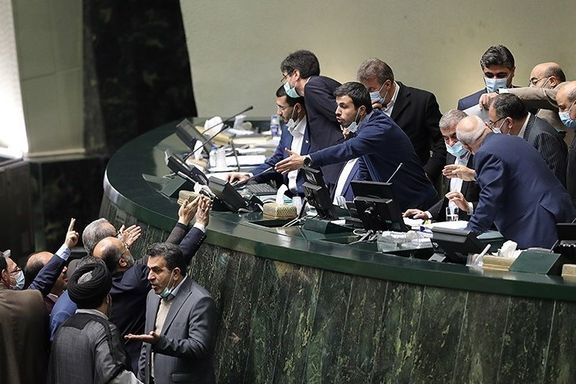Spying Charges Awaiting Iranians Who Speak To Foreign Media

Speaking to Persian-language media funded by "hostile governments" and overseas opposition groups would be deemed espionage under draft legislation in Iran.

Speaking to Persian-language media funded by "hostile governments" and overseas opposition groups would be deemed espionage under draft legislation in Iran.
The Legal Bureau of the Iranian Parliament's Research Center has drawn up legislation stipulating that Iranian citizens should cooperate with such media outlets only if they can thereby defend the "entity of Islamic Republic."
The draft bill entitled "Raising Punishment for Espionage and Collaboration with Hostile Governments" redefines and broadens the concepts of "espionage" and "hostile government" and criminalizes any cooperation with foreign think-tanks, media, and even charities of "hostile countries".
"Any group, organization or government that is in war with the Islamic Republic, seeks to overthrow it, or takes actions that endanger Iran's national security" − including assisting United States sanctions or exerting economic damage on Iran − would be considered "hostile."
As examples of such media outlets, the draft bill names the BBC, the United States-funded Voice of America, and the London-based TV channels Manoto TV and Iran International.
Sending video footage, audio files, photos, or any data to such media could be considered collaboration with enemies, espionage, or 'corruption on earth,' and thereby punishable by sentences including the death penalty.
Foreign-based opposition media and those affiliated to foreign governments considered hostile, including BBC Persian, are not permitted to maintain offices or post correspondents to Iran. They instead use reports, photos, and video-footage sent through social messaging. Anyone working or cooperating with the named outlets would be required to end their relationship within a month of the bill entering law.
In recent years, Iranian journalists working overseas, including for Iran International, and their family members in Iran have reported harassment and intimidation by security and intelligence bodies, including in the countries where they live and work.
In February the BBC filed a complaint to the United Nations over what it said was harassment of journalists in its Persian-language channels and their families including the freezing of their assets in Iran.
Variety of channels
While the Iranian government has a monopoly on terrestrial broadcasting, Iranians have for at least two decades accessed satellite television channels. The Persian-language channels of the BBC and Voice of America claim a significant audience.
The state broadcaster, Islamic Republic of Iran Broadcasting (IRIB), runs a variety of radio and television channels including several for foreign audiences including the English-language Press TV and Al Alam in Arabic and several other channels in Spanish, French and other languages.
An opinion survey conducted by the state-run Iranian Students Polling Agency (ISPA) in September 2021 found that the of IRIB viewership news had declined since 2016, with its popularity falling between March and September 2021 from 57.7 percent to 42.1 percent.
The Paris-based Reporters Without Borders (RSF) ranked Iran 174 in its 2021 World Press Freedom Index, a measure of freedom experienced by journalists in the country. This put Iran behind Syria and just ahead of Vietnam. RSF has described Iran as one of the world's biggest jailers of journalists.